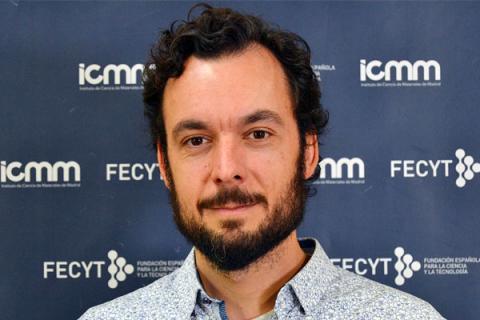Andrés Castellanos, ICMM' Scientist, awarded the national prize for young researchers for his investigations of two-dimensional materials

Andrés Castellanos Gómez, Senior Scientist at Instituto de Ciencia de Materiales de Madrid (ICMM), CSIC, and part of the 2D Foundry Group, has been awarded the National Prize for Young Researchers for his contributions to the investigation of two-dimensional materials that stand out for their originality and potential in this area of science. The prize, given by the Ministry of Science of Spain, is the most important recognition in Spain in the field of scientific research.
The Ministry of Science emphasizes Castellanos’ works: “In his research, he explores new atomic-thick materials and studies their mechanical, electrical, and optical properties with a special interest in the application of these materials in nanomechanical and optoelectronic devices”.
Diana Morant, minister of Science in Spain, has highlighted that these awards value the science that researchers are doing in our country. She wanted to underline the work of the researchers with exceptional careers, who “dedicate their lives to generating knowledge and translating it into applications for society”.
In fact, it was the minister herself who phoned Castellanos, who now tells how he could not say a word until the award was public: “I went to an afternoon off”, says. Still, he is assimilating the prize: “I am thrilled by this recognition”, tells us.
Now with the news about the prize, he just wants to thank everybody who has helped him during his career: “Perhaps it can sound a cliché, but behind this recognition, you can find the work, contribution, and influence of many people”, explains. “Mentors during the thesis, the post-doc, collaborators who helped me when I landed back in Spain and I didn’t have a penny… and, of course, the past and current members of the group, who are the best”, adds.
He is proud of his and his group's work: “We have a style of doing science a bit unconventional”, explains. In his words, he talks about two “great crusades” and how they manage them: in one hand, they want the democratization of science, so they focus on developing easy and cheap techniques and methods “that can be implemented in almost any laboratory, coupled with great transparency in sharing our results”. On the other hand, he is very interested in the generation of 'useful science’: “We often publish results which are not 'groundbreaking' but we spend a lot of time publishing good datasets that can help other scientists to move faster”, adds.
National Prize for Young Researchers
The Ministry of Science and Innovation has created these awards for the first time to distinguish the merit of researchers from Spain who have achieved relevant achievements in the early stages of their careers. The ten modalities are named after illustrious women researchers from Spain, outstanding in each of their respective areas of knowledge. In fact, Castellanos’ prize is called ‘Felisa Martín Bravo award in the field of Physical, materials, and ground Science’.
Morant has stated that these new awards recognize young talent but also do justice to the scientists who have contributed to the progress of our country and who have been forgotten for too long.
These awards, endowed with 30,000 euros for each modality, are aimed at people with a maximum age of 40 years, who are carrying out relevant and internationally recognized work in a Spanish institution. Of the 185 applications admitted, 61% were men and 39% women. The average age of the winners is 38 years old.
-- ICMM Comunication / Text: Ángela R. Bonachera - Photo: Carlos Arroyo (Morgan) --
Instituto de Ciencia de Materiales de Madrid (ICMM)
Sor Juana Ines de la Cruz, 3
Cantoblanco, 28049
Madrid, España
Telephone: (+34) 91 334 90 00
Email: @email
Communication Office: @email

Acknowledge the Severo Ochoa Centres of Excellence program through Grant CEX2024-001445-S/ financiado por MICIU/AEI / 10.13039/501100011033

Contacto | Accesibilidad | Aviso legal | Política de Cookies | Protección de datos
